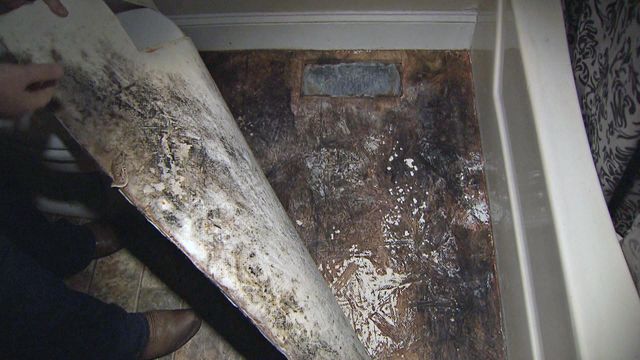Renters have little recourse but to record problems with mold
The spots, the smell and the struggle with mold and mildew are a common complaint to 5 On Your Side.
Posted — UpdatedThe spots, the smell and the struggle with mold and mildew are a common complaint to 5 On Your Side. When it's your house, you know you have to take care of it.
But what about renters? Those who are stuck in a lease still have some recourse.
Rent or own, mold is everywhere. It just needs moisture to grow. Some people have severe reactions to it. Others are totally unaffected. Everyone knows that wherever mold and mildew are growing, the problem should be cleaned up and fixed!
April Turpin and Alex Garner lived in a rental home in Coats for two and a half years. They found the first signs of a problem on a bathroom floorboard, and they contacted their landlord.
"The stuff on the walls is mold as well," she pointed out.
They found mold, mildew and moisture in the master bedroom and on the kitchen cabinets and walls.
Garner and Turpin say moisture actually dripped from the ceiling.
"We literally would put light bulbs in the ceiling probably once a month," Garner said. "Every single one of them would pop and blow along the way."
Garner and Turpin say they repeatedly asked for help from their landlords, Pat Cameron and Michael Jackson, owners of CamJac Properties in Erwin. They claim the landlords originally offered to pay their moving expenses, but declined when presented with an estimate.
"They handled things, initially, professionally, but as soon as stuff took a turn, not in their favor, the whole entire atmosphere of the situation changed," Garner said of Cameron and Jackson.
Again, the renters contacted CamJac.
Cameron and Jackson didn't talk on camera.
Their attorney provided a mold report that said a testing company CamJac hired found "common household mold" that "can be prevented by proper cleaning and maintenance."
Turpin and Garner eventually ended up moving out and filing a lawsuit. The house they rented is up for sale.
"It has impacted our lives completely," Turpin said through tears.
The couple is just one example of a problem 5 On Your Side hears all the time, renters battling landlords about the presence of mold.
- In Raleigh, a renter found mold and mildew were growing on furniture, shoes and clothes, and the landlord won't respond.
- In Willow Springs, a renter said their house is making them sick.
- A Henderson renter was told to clean with bleach but the mold continued to spread.
Attorney Madlyn Morreale is not involved in any of those specific cases, but she does regularly handle landlord/tenant issues.
Her top advice for dealing with mold is just what Garner and Turpin did: Document everything.
"First thing, look for the source, then talk with the landlord," she said.
"Ask the landlord, in writing, to come and take a look at things and make repairs. Keep copies of the written request and follow up if the landlord makes promises. Write down who said what would be done."
Renters should also take pictures of problems as proof and make sure they are labeled and dated.
That can make some tenants hesitant.
One step frustrated renters should never take: Stop paying rent. That is grounds for eviction, no matter what the underlying reason.
"I want to stress that when the landlord has not made repairs, the tenant should continue to pay the rent," Morreale said. "That's a hard pill for many people to swallow."
She said tenants can negotiate to pay less in rent in one of two ways: They can offer to pay for repairs and deduct any money spent from future rent payments, or they can ask the landlord if they can pay less rent until the repairs have been made by the landlord.
"Tenants should not take-on those expenses without an understanding from the landlord," she cautioned.
Another option is for tenants to request code enforcement to inspect the property.
"If there are violations, code enforcement will require the landlord to make repairs," Morreale said.
That can be important for the next tenant.
Getting mold under control
Controlling humidity in the home can make a big difference. Make sure that damp areas like bathrooms and kitchens have good ventilation.
Once you find the source of mold, remove any damp items from the area. According to the Centers for Disease Control, household items that stay wet for two days can have mold growing on them even if you can’t see it.
Washable items should be cleaned in hot water with bleach and left out to dry. Hard surfaces like countertops, floors and walls should be scrubbed with a solution of 1 cup of bleach to 1 gallon of water and dried completely.
Tenants have rights, responsibilities
Tenants have a responsibility to under the law to pay rent on time, to keep a place in good repair and to put the landlord on notice if there are problems.
Any tenant should carefully review their lease before signing and ask for an inspection of a home or apartment before moving in. Put any pre-existing issues in writing so you can follow up with the landlord.
• Credits
Copyright 2024 by Capitol Broadcasting Company. All rights reserved. This material may not be published, broadcast, rewritten or redistributed.





